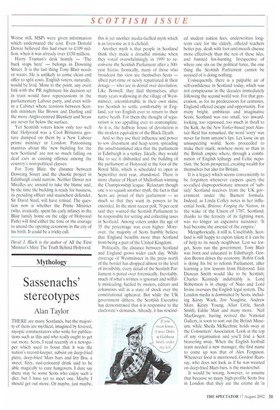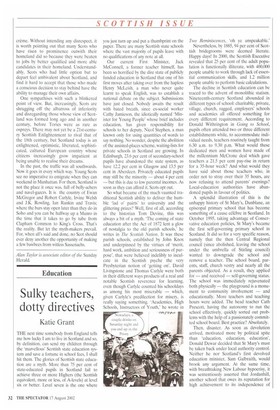Mythology
Sassenachs' stereotypes
Alan Taylor
THERE are many Scotlands. but the majority of them are mythical, imagined by fevered, myopic commentators who write for publications such as this and who really ought to get out more. Scots, I read recently in a newspaper which used to boast that it was the nation's record-keeper, subsist on deep-fried pizza, deep-fried Mars bars and Irn Bru, a sweet, fizzy, rust-coloured drink said to be able magically to cure hangovers. I dare say there may be some Scots who enjoy such a diet, but I have yet to meet one. Maybe I should get out more. Or maybe, just maybe, this is yet another media-fuelled myth which is as tiresome as it is cliched, Another myth is that people in Scotland think they made a dreadful mistake when they voted overwhelmingly in 1999 to reconvene the Scottish Parliament after a 300year hiatus. Ironically, many of those who broadcast this view are themselves Scots — albeit part-time or newly repatriated in their dotage — who are in denial over devolution. Like Boswell, they find themselves, after many years wallowing in the village of Westminster, uncomfortable in their own skins; too Scottish to settle comfortably in England, yet too English ever to return to their native heath. For them the thought of separatism is too appalling ever to contemplate. As it is, the halfway house of devolution is the modern equivalent of the Black Death.
And so they use their influence and power to sow discontent and heap scorn, spreading the unsubstantiated idea that the parliament in Edinburgh is a turkey. Ideally, they would like to see it disbanded and the building of the parliament at Holyrood at the foot of the Royal Mile, which is scheduled to open in September next year, abandoned. There is more chance of Heart of Midlothian winning the Championship league. Reluctant though one is to squash another myth, the fact is that Scots are proud of their parliament — so much so that they want its powers to be extended. In the most recent poll, 70 per cent said they wanted the Scottish Parliament to be responsible for setting and collecting taxes in Scotland. Among voters under the age of 35 the percentage was even higher. Moreover, the majority of Scots humbly believe that England benefits more than Scotland from being a part of the United Kingdom.
Politically, the distance between Scotland and England grows wider each day. While coverage of Westminster in the press north of the border has dropped almost to the level of invisibility, every detail of the Scottish Parliament is pored over forensically. Inevitably, much of what's written is ignorant and wilfully misleading, fuelled by owners, editors and columnists still in a state of shock over the constitutional upheaval. But while the UK government dithers, the Scottish Executive has demonstrated that it is responsive to the electorate's demands. Already, it has rescind ed student tuition fees, underwritten longterm care for the elderly, offered teachers better pay, dealt with foot-and-mouth disease more effectively than the rest of these isles, and banned fox-hunting. Irrespective of where one sits on the political fence, the one thing the Scottish Parliament cannot be accused of is doing nothing.
Consequently, there is a palpable air of self-confidence in Scotland today, which was not conspicuous in the decades immediately following the second world war. For that generation, as for its predecessors for centuries, England offered escape and opportunity. For many bright, ambitious and imaginative Scots, Scotland was too small, too inwardlooking, too repressed, too much in thrall to the Kirk. As the New Yorker-based poet Alastair Reid has remarked, the word 'sorry' was never far from anyone's lips. Let loose on an unsuspecting world, Scots proceeded to make their mark; nowhere more so than in the British empire where, through a combination of English lethargy and Celtic nepotism, the Scots prospered, creating wealth for themselves but also for Britain.
It is a legacy which seems conveniently to be forgotten whenever campers query the so-called disproportionate amount of 'subsidy' Scotland receives from the UK government under the Barnett formula. Indeed, as Linda Colley notes in her influential book, Britons: Forging the Nation, in the wake of the Union of 1707, Scotland, thanks to the ferocity of its fighting men, was no longer an expensive nuisance: 'It had become the arsenal of the empire.'
Metaphorically, it still is. Unselfishly, Scotland is still happy to export talent if it can be of help to its needy neighbour. Lest we forget, Scots run the government. Tony Blair was born and educated in Edinburgh. Gordon Brown drives the economy. Robin Cook is doing his bit to reform Parliament, after learning a few lessons from Holyrood. lain Duncan Smith would like to be Scottish; Charles Kennedy indubitably is. Lord Robertson is in charge of Nato and Lord Irvine oversees the English legal system. The London media is dominated by Scots, including Kirsty Wark, Jim Naughtie, Andrew Marr, Kirsty Young, Allan Little, Sarah Smith, Eddie Mair and many more. Neil MacGregor, having revived the National Gallery, is soon to sort out the British Museum, while Sheila McKechnie holds sway at the Consumers' Association. Look at the top of any organisation and you'll find a Scot beavering away. When the English football team needed a new manager, the first name to come up was that of Alex Ferguson. Whenever food is mentioned, Gordon Ramsay, who does not look as if he was weaned on deep-fried Mars bars, is the masterchef.
It would be wrong, however, to assume that because so many high-profile Scots live in London that they are the creme de la creme, Without intending any disrespect, it is worth pointing out that many Scots who have risen to prominence outwith their homeland did so because they were beaten to jobs by better qualified and more able candidates in their homeland. Understandably. Scots who had little option but to depart feel ambivalent about Scotland, and find it hard to accept that those who made a conscious decision to stay behind have the ability to manage their own affairs.
One sympathises with such a blinkered point of view. But, increasingly, Scots are shrugging off the albatross of inferiority and disregarding those whose view of Scotland was formed long ago and in another century, before Tories were as rare as ospreys. There may not yet be a 21st-century Scottish Enlightenment to rival that of the 18th century, but Scotland today is an enlightened, optimistic, liberated, sophisticated, cultured European country whose citizens increasingly grow impatient at being unable to realise their dreams.
In the past, the traffic was all southwards. Now it goes in every which way. Young Scots see no imperative to emigrate when they can weekend in Manhattan. For them, Scotland is not the place it once was, full of belly-achers and navel-gazers. It is the country of Ewan McGregor and Robert Carlyle, Irvine Welsh and J.K. Rowling, Ian Rankin and Travis; where the bars stay open later than they do in Soho and you can be halfway up a Munro in the time that it takes to go by tube from Clapham Common to King's Cross. That's the reality. But let the myth-makers prevail. For, when all's said and done, no Scot should ever deny another the opportunity of making a few bawbees from witless Sassenachs.
Alan Taylor is associate editor of the Sunday Herald.































































 Previous page
Previous page